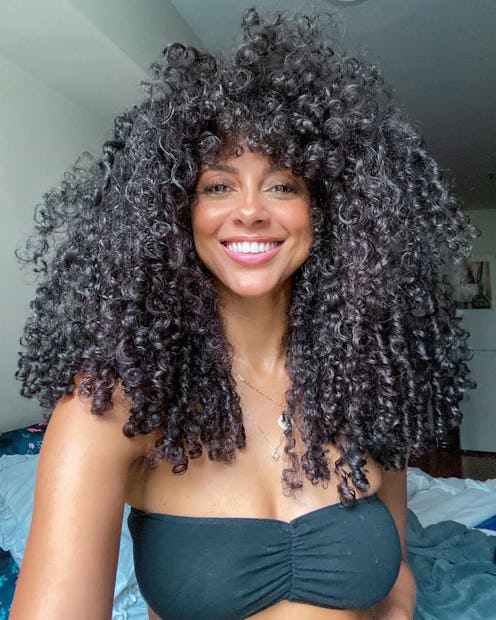(Hair)
Is Your Shower Making Your Hair Dry & Frizzy? This Sneaky Culprit May Be To Blame
The key to long-lasting good hair days.

Although finding products that are specific to your hair type, curl, volume, and color is beneficial for your hair care routine, there is another important factor to good hair days: your water type. There are two types of water, hard or soft, that refer to the density and amount of minerals in water. For hard water, according to Ted Gibson, celebrity hairstylist and salon owner, this means, “Water that has a lot of sulfates and minerals in [it] that makes it harsh on the hair.” Essentially, the more calcium and magnesium (think: iron, copper, sodium, and lime) the harder the water is — and this can have a big effect on your hair’s overall health.
As it turns out, mineral-rich water or hard water can have side effects (more on those later) on your hair, no matter how beneficial your product assortment is, meaning you could still experience dry and frizzy hair. But that doesn’t mean there aren’t steps you can take if you live in an area with hard water (and yes, certain parts of the country do have harder water than others).
Ahead, TZR spoke to top hairstylists and trichologists to get the scoop on the damaging effects of hard water as well as ways to prevent and treat the damage, and the best product recommendations to keep your hair healthy and manageable.
What Does Hard Water Do To Hair?
With the excess amount of minerals, hard water has a tendency to make hair feel crispy since the minerals cling to the hair when it evaporates. Basically, when the hair is wet, minerals from hard water penetrate the strands and crystallize as your hair dries. The crystallization then forms a cast that prevents moisture from getting in or out of your hair — leading to dryness, tangles, and breakage.
Although all hair types can become compromised by hard water, it’s especially damaging to porous hair (types 3 and 4) as the hair is already prone to dryness and frizz, allowing minerals to penetrate deeper into the hair structure. This is the same for color- and chemically-treated hair: hard water can cause early color fading, greasiness, and weigh down the hair for a limp appearance.
How To Tell If Your Hair Has Been Affected By Hard Water
If you notice water deposits on your sink faucet, dishes, and shower head, really what you are seeing is the crystallization of the mineral residue from hard water. The minerals also tend to build up so if your water pressure is low in your sinks or shower, this is also a good sign you have hard water.
When washing your hair, be sure to notice how you apply your shampoo. If it takes long to lather and distribute, you might have hard water. Or, if your conditioner makes your hair feel dry and tangled, that could be another sign that you’re dealing with hard water. In terms of what your hair might look like, Gibson says hard water can cause greasy hair that is harder to cleanse, dull hair that has little shine, frizzy hair from the mineral deposits, and clogged follicles and pores that could block products from getting in and lead to irritation.
What Happens If You Don’t Address Hard Water For Your Hair?
“If you leave hard water build-up untreated, it can lead to hair loss, as well as affect hair color results, the ability to lighten the hair, the hair [can] lack shine and is dull, and styling can be challenging without a lot of tools or heat,” says Min Kim, colorist and L’Oréal Professionnel US and global ambassador. Meaning, finding a hair care regimen to prevent and treat hard water damage will be paramount in helping keep your hair healthy and manageable, no matter how you choose to style or process it.
What Products Minimize Damage From Hard Water?
Shower Filter
“Hard water will leave a film or residue on the hair which will make it feel dry and brittle and produce a lot of buildup,” says Bianca Garcia, Bumble and Bumble hairstylist. To mitigate the most damage, invest in a shower filter. Whether you completely replace your shower head or attach a filter to your current one, it will help to filter out minerals like magnesium and calcium, the two main causes of dry and brittle hair, and lessen the residue on strands.
Pre-Shampoo
Applying a hair treatment prior to washing your hair will act like an armor to hard water, decreasing the penetration of minerals into the hair fiber. Pre-shampoos remove buildup and promote a balanced scalp before your shampoo goes in and help you to achieve a thorough cleanse.
Clarify The Hair
As a good rule of thumb, Cyd Charisse, Hairstory hairstylist recommends clarifying your hair once or twice a week. Clarifying shampoos have ingredients like tetrasodium EDTA or EDTA complex, that bind to the metals and minerals in water. It’s stronger than traditional shampoo and will not only cleanse but detoxify the scalp of prior damage.
Ready to rid your hair of hard water issues? Try some of the expert-approved products below.
We may receive a portion of sales if you purchase a product through a link in this article.